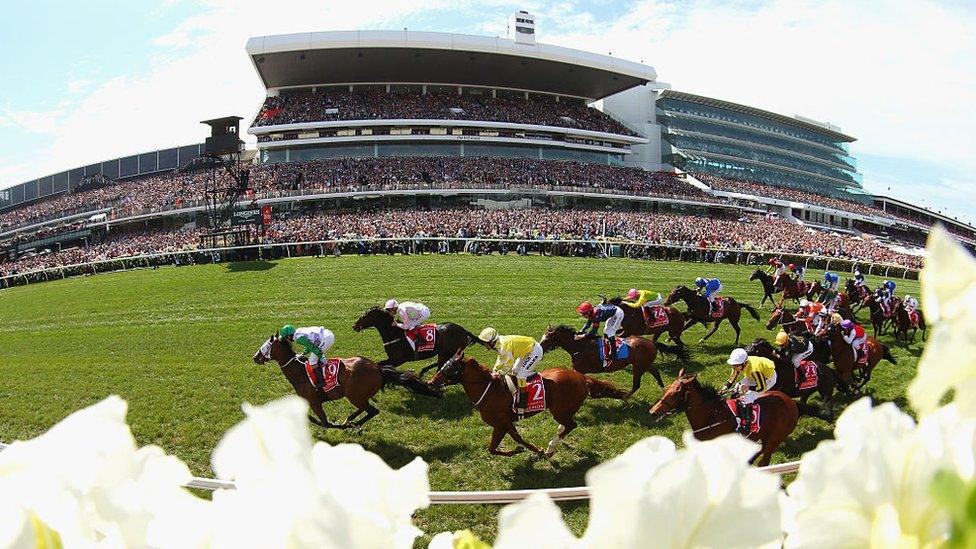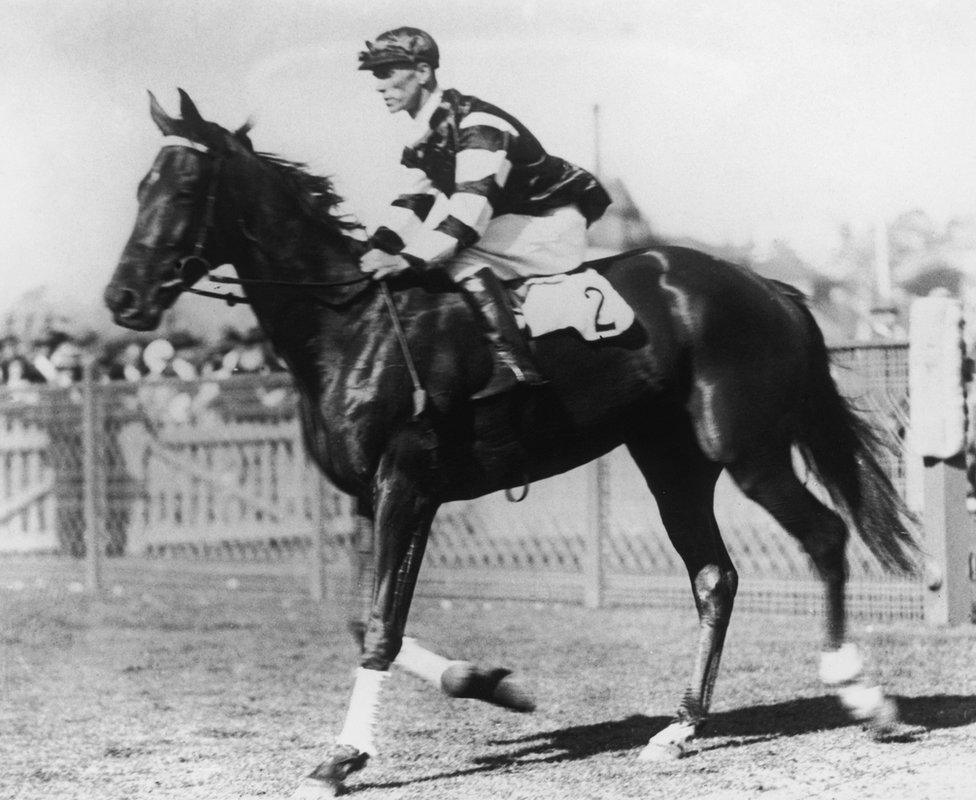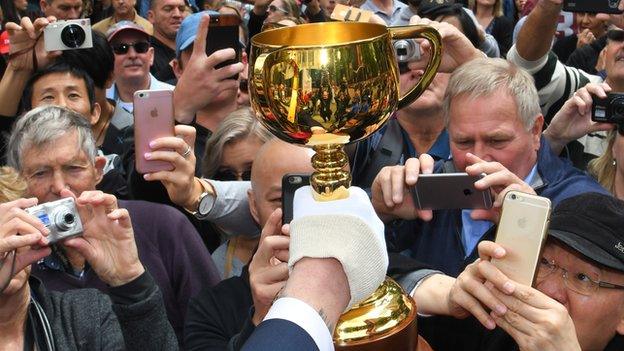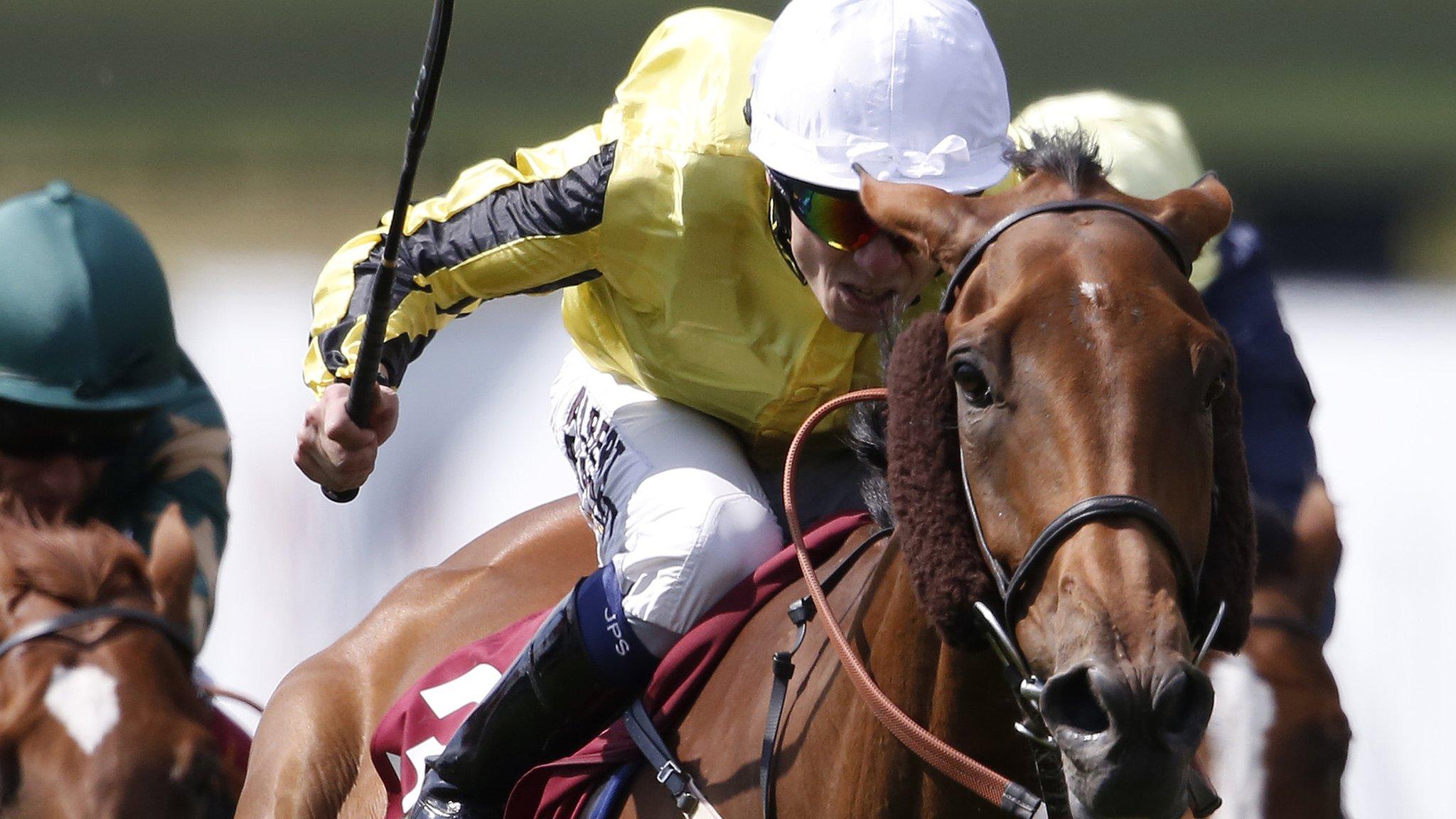How the Melbourne Cup became Australia's prestigious race
- Published

Thousands line the track at Flemington Racecourse for the world-renowned Melbourne Cup
From high-rise offices to dusty Outback mines, Australia grinds to a halt every year on the first Tuesday of November.
Melbourne Cup day is a designated public holiday in Victoria, but even elsewhere in the nation, workers will down tools come race time at 3pm.
The two-mile thoroughbred race is Australia's equivalent of Britain's Grand National or America's Kentucky Derby, capturing the world's attention for the three-and-a-half minute spectacle.
Known as "the race that stops the nation", the Melbourne Cup began more than 150 years ago amid gold rush-era Australia.
The Cup's social early days
Just 4,000 people packed Flemington Racecourse for the first race in 1861, with inaugural winner Archer rumoured to have claimed a gold watch rather than the iconic Cup of today.
The event grew quickly, however, taking on a carnival-like atmosphere as it attracted the rich and famous - not to mention the latest trends in fashion.
By 1880, when Melbourne had a population of just 290,000 people, the Cup itself drew 100,000 people from around Australia, according to the Victoria Racing Club.
"The champagne flows, everybody is vivacious, excited, happy," Mark Twain wrote in 1895.
"Nowhere in the world have I encountered a festival of people that has such a magnificent appeal to the whole nation. The Cup astonishes me."
The famous gold Cup presented today first appeared for the 1919 race and is now estimated to be worth US$95,000 (£78,310).

Australia's most famous horse Phar Lap, a year before winning the Melbourne Cup in 1930
'Schools stop, parliament stops'
Some 100,000 spectators are expected to line the Flemington track on Tuesday, clutching cold drinks in one hand and perhaps a betting slip in the other.
Elaborate headwear and frocks are the traditional attire for women; suits, colourful ties and pocket handkerchiefs for men.
Race organisers claim this year's event will be watched by up to 700 million people in more than 120 countries.
"It's not a cliché to say that the nation stops for the Melbourne Cup. It literally does. Schools stop, parliament stops and everything in between," says sports broadcaster Gerard Whateley.
"The fact that it was conceived as a handicap race rather than elite quality race speaks about the way Australia grew up essentially. It was a race to be won by any horse or any person in the colony as opposed to creating a hierarchy of the greatest."
It is a celebration that is inextricably linked with alcohol and gambling.
Australia has the world's highest gambling loss per head, according to UK consultancy H2 Gambling Capital, with Australians losing an average of US$1,130 a year.
And it is said that if all the bottles of champagne dunk during the carnival were placed end-to-end, they would easily line the track.
"The whole thing has turned into a thing where people are going to quite a few days without seeing a race let alone a horse," says HG Nelson, the Australian comedian and sports personality.
"It's probably got a lot to do with people saying 'this is Australia's day, and we're going to celebrate it like Australians', which is largely eating and drinking," he says.
Patrick Bartley, racing editor for The Age newspaper, said the appeal of the event is its camaraderie and uniquely level playing field.
"It is said that the CEO of the company stands next to the boy in the mailroom for a sweep," he said.
He argues that despite concerns that the charm of the race could disappear with the rise of international runners, the event has not lost its momentum.
"We're actually quite quizzical about where these horses come from whether it's Germany, Ireland, France, England, Hong Kong or France - it's become an international event," he says.
The barbecues, the office sweeps and the bets have continued year after year.
"For most, it's a glass of champagne, it's a ticket," Barley says. "No one can stage a race like this."

Melbourne Cup in numbers
First run: 1861
Attendance record: 122,736 (2003)
Most wins as trainer: 12 - Bart Cummings (1965, 1966, 1967, 1974, 1975, 1977, 1979, 1990, 1991, 1996, 1999, 2008)
Race record: Kingston Rule (3:16.30) in 1990
First female jockey to win: Michelle Payne - Prince of Penzance (2015)
Source: Victoria Race Club
- Attribution
- Published31 October 2016

- Attribution
- Published29 October 2016
